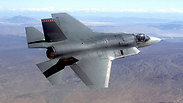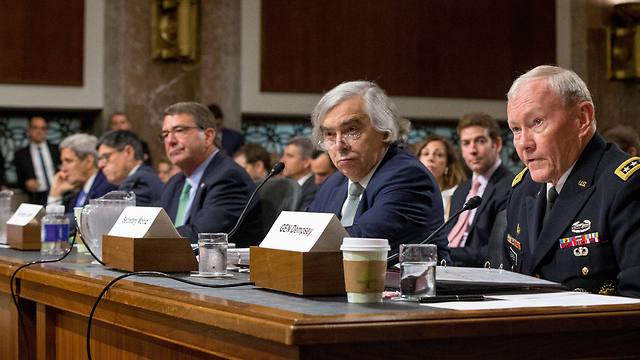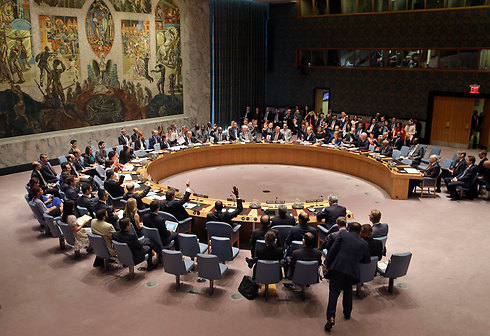
US can't defend Israel against a nuclear attack
Analysis: A senior American official has vowed to protect Israel if it is attacked by Iran, but the only way to deter the ayatollahs from launching a surprise attack on Israel is by deploying tens of thousands of US soldiers on Israeli territory.
It's not as clear what the senior American source meant when he said that Israel was an ally and that the US would defend it if were attacked, just like the US was committed to defend members of the North Atlantic Treaty Organization (NATO).
It's unclear, for example, if when saying that Israel was an ally that the US would defend, the senior American security official was referring to the informal alliance between the US and Israel, an alliance which led to the deployment of American Patriot batteries on Israeli territory in 1991 to defend it against Saddam Hussein's missiles. These batteries did not intercept a single Iraqi Scud missile, as the Patriot deployed in Israel was of an old model, but it was the same intention.
That informal defense alliance between Israel and the US is also reflected in anti-missile and anti-aircraft defensive exercises which are occasionally conducted between Israel and the American Navy and interception systems on Israeli territory.
But it's hard to see this informal alliance between Israel and the US, which mostly includes deploying defensive and deterrence measures on Israeli territory, defending Israel against an Iranian nuclear attack.
If Iran decides to attack Israel with a nuclear weapon – or even not with a nuclear weapon – it is completely reasonable to assume that it will be a surprise attack. There is no chance that the US will be able to defend us against such an attack, especially a nuclear attack, unless the Americans deploy a significant amount of forces on Israeli territory – tens of thousands of soldiers with missile batteries, radars and other measures, who will be on constant alert and ready to intercept ballistic missiles, cruise missiles and planes arriving with a deadly cargo from Iran or from Iraq, Syria and Lebanon, Iran's allies.
Stationing tens of thousands of American soldiers on Israeli territory will be the most efficient way to deter Iran or anyone else from attacking Israel with a mass destruction weapon – nuclear, chemical or biological.
Such a deployment of American defense forces against missiles will violate the principle reiterated by all Israeli prime ministers and defense ministers, starting from David Ben-Gurion in the 1960s, that "Israel will defend itself on its own, and I don’t want even one American soldier to shed blood for our sake."
The US is committed to defend its allies as part of the North Atlantic alliance, but in this case we are talking about a coalition in which most countries share a border with the former (and perhaps current) potential enemy – the Eastern bloc armies. The US committed and is still committed to defend them, and as part of this commitment it stationed – together with Britain and Canada – infantry, armored and air forces in Germany in order to ward off an attack from the east.
Israel doesn’t share a border with Iran and is being threatened with a nuclear weapon, so the only thing that could deter the ayatollahs would be the physical presence of many American soldiers who may be hurt by the Iranian attack, as any attack on Israel would be considered a direct attack on the US as well.
Is this the kind of deterrence the Americans are alluding to? They have an exact same alliance with South Korea, which is aimed at balancing the horror and threat of annihilation which North Korea's military and nuclear power poses to its southern neighbor.
The US holds 40,000 soldiers in South Korea on a permanent basis in order to deter North Korea's leader from even trying to attack the South, and keeps a nuclear weapon both in South Korea and in Japan for the same purpose. It's quite reasonable to assume that the American security official was not referring to this type of defense – or was he?
The senior American official's intention may have been to imply that if Israel asks for a formal defense alliance with the US so that the US will extend a conventional military and nuclear umbrella over Israel in order to deter the Iranians, that request will be accepted, or will at least be seriously considered by the Obama administration.
I doubt that was the American intention. The vague statements that Israel is an ally were only meant to calm the Israelis down and they will not be given any practical meaning in the strategic relations between Israel and the US beyond that.
Israel can, however, welcome the unequivocal and detailed promises of the senior American security official on maintaining Israel's military and intelligence advantage, and the commitment not to sell F-35 jets or special weapons to Arab states in a way that will make it easier for them to attack Israel. The US has offered the Gulf states, led by Saudi Arabia, military compensation, and the American official explicitly promised that this equipment would not divert the conventional military balance of power between Israel and its neighbors against Israel.
The senior American official's comments leave a lot of room for doubts and questions. Let's hope that after the American Congress completes the saga of approving the removal of the sanctions on Iran, the Israeli government will finally sit down with the Americans to discuss the fulfillment of the promises that the Obama administration is now throwing around so generously.













